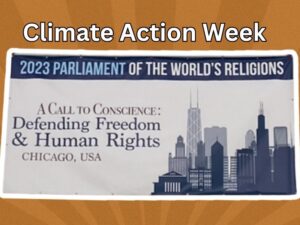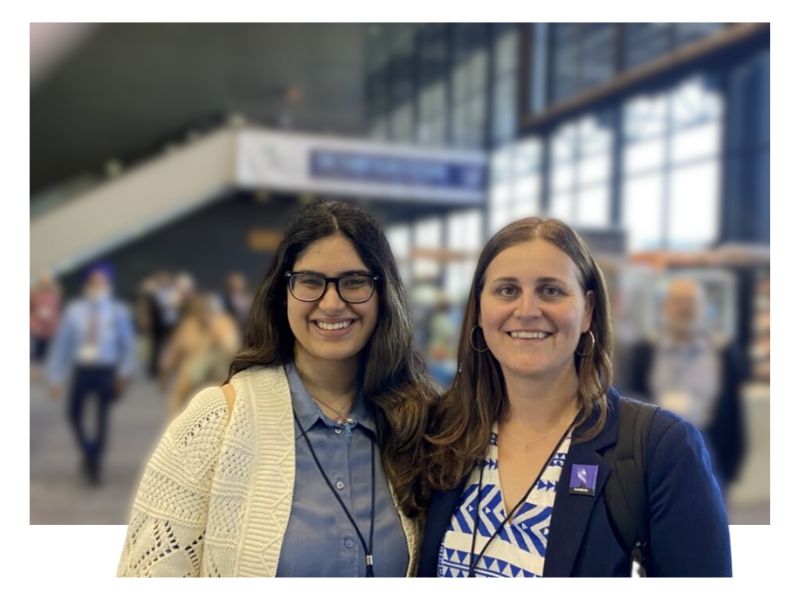Reflections on Interfaith Climate Action from the Parliament of the World’s Religions

My time at the Parliament of the World’s Religions was an extremely enlightening experience from beginning to end. It is not every day that you get to attend a convention of thousands of people of different identities – all hailing from different backgrounds, different countries, and different cultures. It is a truly special feeling to witness over seven thousand individuals all advocating for the importance of religious values, interfaith dialogue and valuable communication. From the moment I stepped into the convention centre, I understood that this was a place of diverse voices, but united values, and this on its own was an incredible privilege.
In a conference as large and busy as this one, there were multiple meetings, seminars, workshops and plenaries happening simultaneously. These covered a range of important and topical themes, and while I had a fantastic time attending the large assembly gatherings and learning topics such as womanhood, climate justice, and water, for me, one of the most meaningful parts of the experience was the workshop that I led with the Loreto Sisters at the Mary Ward Centre, who graciously sponsored my trip. When our team first started discussing this workshop, we had several goals. We wanted the workshop to be intergenerational, interfaith and spanning multiple topics. We utilised a conversation circle model developed by the IBVM Loreto Sisters at the United Nations and adapted it to suit the needs of our workshop. We planned for a workshop that would resonate with as many people as possible, and, as such, drew inspiration from our own backgrounds, interests, and the themes of the Parliament. This resulted in the creation of our three primary themes: Climate Change, Mental Health, and Threats to Democracy. We titled the workshop ‘Conversations That Matter’, and we were determined to make an impact.
Once we had the topics, our next step was to formulate questions – and for that, we had to ensure we struck a balance: questions must be broad, but still focused; they must be interesting, but not too niche or full of jargon; they must be important, but not intimidating – after all, we couldn’t ask our participants to discuss all of world’s problems in just under an hour!
The group I facilitated at this workshop discussed Climate change. I was truly blessed to have a truly intergenerational group, which allowed for our discussion to be multifaceted. This was made all the more special when during introductions, we learnt how many different faith groups were choosing to contribute to our little group. I was heartened to see so many different individuals, from all walks of life, all on the same page about something so incredibly integral to our world. Not only did the participants share formal thoughts and opinions that were academic in nature, but they also shared personal moments – memories, stories, conversations – which added a valuable personal spin to our conversation.

There are several points that stood out to me during our brief, 40-minute conversation. One young person in our group shared a story about how their co-worker followed a recycled garbage disposal truck, just to see where it would end up. The coworker reported that the so-called ‘recycled garbage’, ended up in the same landfill as all the other garbage. While this story was quite dismaying, it is important to celebrate the fact that individuals care enough to be proactive and take initiatives like these. An older participant shared how older individuals in society can, and should, contribute to fixing the climate crisis. They mentioned how older individuals have money and time, which complements the skillset of the younger population, who have the organizational skills and the energy. This made for a very compelling case. From the other conversation groups, participants shared their experiences with the difficulty of obtaining and accessing mental health resources. When it came to examining threats to democracy, participants stressed the importance of interfaith dialogue and interfaith gatherings – citing that faith groups have a unique place in society to leverage relationships, create unity and spread conducive values.
In conclusion, it goes without saying that I deem the Parliament of the World’s Religions a success – not just in terms of the number of participants, but in the value of participants, and the unique ideas they brought to the table. Interfaith dialogue is a global movement, and one I am incredibly grateful to be a part of.
By Yusra Shafi, International student from Kuwait at the University of Toronto, and an intern at Development and Peace.
Learn more about Interfaith Climate Action from the Parliament of the World’s Religions:
- Climate Action 2023 Statement – The Turning Point, David Hales, Chair of the Climate Action Task Force of the Parliament of the World’s
- An Urgent Call to Protect the Amazon, Leaders at the Parliament of the World’s Religions, August 2023
- Editorial: Climate Action Requires Interfaith Collaboration, National Catholic Reporter, August 23, 2023








